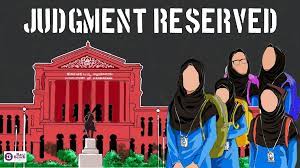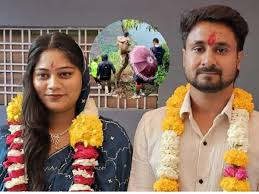Karnataka High Court reserves its verdict after completing the hearing in the ‘hijab’ case

The Karnataka High Court on Friday completed its 11-day hearing in the ‘hijab’ case and reserved its order. Chief Justice Rituraj Awasthi said, “The hearing is completed, the order is reserved.” Along with this, the court also asked the petitioners to give written arguments (if any).
Chief Justice Awasthi, Justice Krishna S. Dixit and Justice JM Qazi was constituted on February 9 and it hears the related petitions on a day-to-day basis. Some of the girls had said in the petitions that they should be allowed to wear hijab in educational institutions where ‘uniform’ is applicable.
In a pre-university college in Udupi in December last, some girls were not allowed to enter the classroom for violating the dress code. Gradually, the dispute spread to other parts of the state as well, leading to tension and violence in educational institutions at many places.
Six girls, who were denied entry because of the hijab, had attended a press conference organized by the Campus Front of India (CPI) on January 1 against the ban on entry. After this Hindu students started keeping saffron shawls in protest.
According to the report, during the hearing on the last day, the bench heard arguments of senior advocates Yusuf Muchhala, Ravivarma Kumar and Mohammad Tahir on behalf of the petitioners. The court also dismissed a PIL seeking restraining of journalists from stalking students and teachers near educational institutions.
According to the Indian Express, social activist and lawyer S. Balan had filed a PIL, alleging that Muslim girls were being harassed by the media and education authorities by forcing them to remove headscarves outside school and college campuses. He had sought the court’s direction to stop the media from stalking the students to prevent them from infiltrating the privacy and forcing the school-college authorities to remove the hijab or burqa at the entrance of educational institutions.
The lawyer argued, ‘girl students have been humiliated’ and called this act of electronic media ‘child abuse’. In the two-week hearing, lawyers for Muslim girls argued that the right to wear a hijab in classrooms was part of freedom of religion and expression. He also criticized the Karnataka Education Department’s February 5 order that said headscarves may be banned in institutions.
The February 5 order was declared unacceptable in administrative practice. It was also argued on behalf of the petitioners that the college committees do not have the power to determine the dress code in pre-university colleges, as they are not statutory bodies.
During the hearing, Karnataka’s Advocate General Prabhulinga Navadgi said the government’s order was not harmful and directed not to ban religious dress, but left it to the discretion of the institutions.
However, he acknowledged that some parts of the order may be unnecessary. He also argued that wearing the hijab is not a necessary religious practice and does not fall under the category of freedom of religion, but freedom of expression, which can be withheld for discipline.
In its interim order, the bench had asked the government to reopen educational institutions that were affected by the agitation and bar students from wearing religious symbols until a final order was issued by the court.
The hijab controversy first started at a government pre-university college in Karnataka’s Udupi district when six girls, wearing hijab, entered a class in December last year and were barred from entering the college.
In response to his wearing of hijab, Hindu students started coming to the college wearing saffron gamchas. In the midst of this controversy, one of these six students had filed a writ petition in the Karnataka High Court requesting to be given the right to wear hijab inside the classroom.
The petition seeks to declare that wearing hijab (head scarf) is a fundamental right under Articles 14 and 25 of the Constitution of India and a compulsory practice of Islam.
A three-judge bench of the Karnataka High Court hearing the issue of hijab had on February 10 asked students not to insist on wearing religious clothes on the premises of educational institutions till the disposal of the matter. Against this decision, a petition has been filed in the Supreme Court.
Refusing to hear it immediately, the Supreme Court had said on February 11 that it would protect the constitutional rights of every citizen and would consider the petitions challenging the Karnataka High Court’s direction in an “appropriate time” to ask students for academics. It has been asked not to wear any kind of religious clothes in the institutions.






